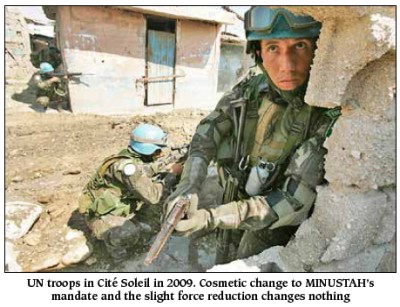|
by Isabelle L. Papillon
 For
more than eight long years, major imperialist powers – the
United States, France, and Canada – have used some 10,000 Latin
American and Asian troops from nations like Brazil, Argentina,
Chile, Pakistan, and Sri Lanka, to deploy the United Nations
Mission to Stabilize Haiti (MINUSTAH). This military occupation
force, the only one in the Western Hemisphere, is an affront to and
violation of the Haitian people’s right to self-determination
and sovereignty. Furthermore, Nepalese UN troops introduced
cholera into Haiti in October 2010. The resulting epidemic, the
world’s worst, has killed over 7,500 Haitians, in addition to
the hundreds who have died from the murderous bullets of UN
soldiers. For
more than eight long years, major imperialist powers – the
United States, France, and Canada – have used some 10,000 Latin
American and Asian troops from nations like Brazil, Argentina,
Chile, Pakistan, and Sri Lanka, to deploy the United Nations
Mission to Stabilize Haiti (MINUSTAH). This military occupation
force, the only one in the Western Hemisphere, is an affront to and
violation of the Haitian people’s right to self-determination
and sovereignty. Furthermore, Nepalese UN troops introduced
cholera into Haiti in October 2010. The resulting epidemic, the
world’s worst, has killed over 7,500 Haitians, in addition to
the hundreds who have died from the murderous bullets of UN
soldiers.
As MINUSTAH’s Security Council
mandate nears expiration – and likely renewal – on Oct. 15, the
Mobilization Collective for Reparations for Cholera Victims is
planning an action in Haiti to demand the departure of UN
occupation forces as well as justice and reparations for all
MINUSTAH victims. The action will also commemorate the Oct. 17,
1806 assassination of Haiti’s founding father Jean Jacques
Dessalines, and the date of the discovery of cholera in Haiti on
Oct. 19, 2010.
Meanwhile, in New York, a broad
Haitian and international coalition will hold an afternoon rally
in front of United Nations headquarters on Oct. 12 to demand
that UN troops get out of Haiti and pay reparations for cholera,
as a pending legal action demands. Brian Concannon, an author of
the lawsuit, and outspoken Senator Moïse Jean-Charles, who has
been leading large demonstrations around Haiti, will travel to
New York to join with prominent Latin American unionists and
parliamentarians in the demonstration. On Oct. 11, a high-level
international delegation of the anti-occupation activists will
meet with officials at UN headquarters and then report back to
the Haitian community in Brooklyn that same evening.
In a half-measure to sugar-coat
the pill, UN Secretary General Ban Ki-Moon has called on the
Security Council to reduce MINUSTAH numbers by June 2013. The
proposal is to scale back UN troops from 7340 to 6270, a
reduction of 1,070 soldiers, and UN police from 3141 to 2601, a
decrease of 640 officers. The “new” mission would focus on
training and supervision of the Haitian National Police.
After a debate on Oct. 3 in the
Security Council, Guatemala’s Ambassador to the UN Gert
Rosenthal, who is the Council’s rotating chairman this month,
said that the body unanimously agreed that MINUSTAH’s mandate
should be extended for another year and the mission
“recalibrated” from peacekeeping to strengthening the police.
This cosmetic change to MINUSTAH’s mandate and the
slight force reduction changes nothing. The force still violates
Haiti’s Constitution and international law in order to protect
U.S., French, and Canadian interests and their local lackeys.
The nearly $1 billion spent yearly to deploy MINUSTAH should be
used to uplift, not police, Haiti’s people, 77% of whom live in
extreme poverty. |